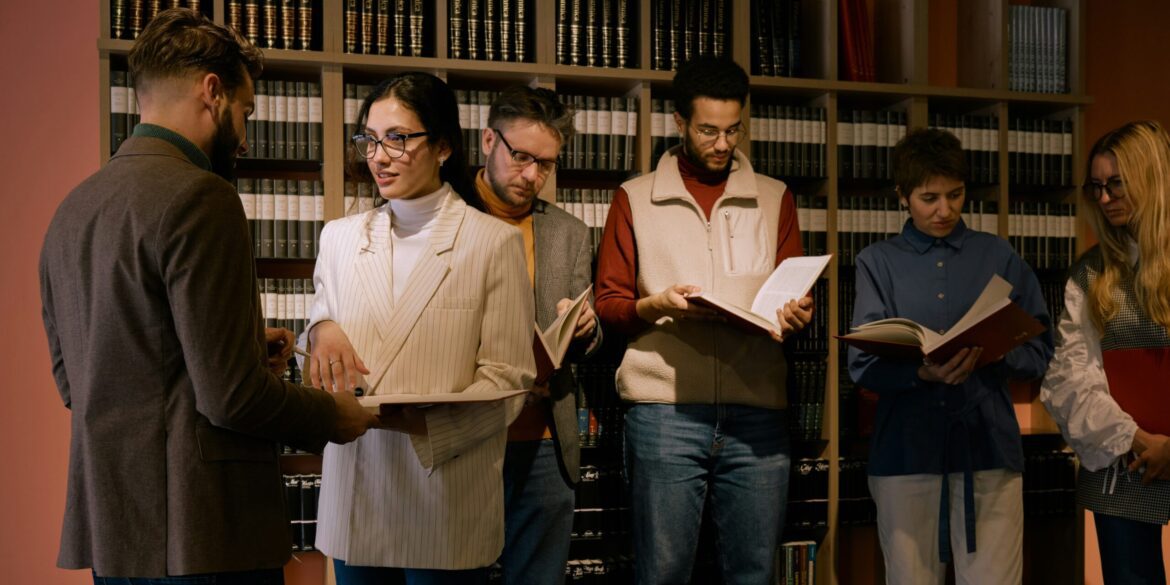The Law Library of Congress, in partnership with the Supreme Court Historical Society, marked Constitution Day with a special cultural and historical event on September 11, 2025. In the Coolidge Auditorium, audiences gathered for the screening of Holmes, a feature-length adaptation of a one-man stage performance centered on Justice Oliver Wendell Holmes Jr., one of the most influential figures in the history of the U.S. Supreme Court.
The screening was part of the Library’s Live! At the Library program, which offers free and public access to cultural events highlighting history, literature, and civic engagement. Attendees also heard remarks from key figures including Law Librarian of Congress Aslihan Bulut, Supreme Court Historical Society Director of Publications Clare Cushman, and Jeanne Dennis, Senior Counsel of Legal Programs. Each speaker emphasized the importance of remembering Holmes’s contributions to constitutional interpretation and legal thought, especially on a day set aside to reflect on the foundations of the American system of government.
Holmes, written by Todd C. Peppers and directed by Bill Goodwin, originated as a solo stage performance before being adapted for the screen. Kevin Reese portrays Justice Holmes as he reflects on his 90th birthday, revisiting his decades on the Court and his earlier service as a soldier in the Civil War. The intimate format blends historical narrative with personal recollections, giving audiences both a sense of Holmes’s jurisprudence and his humanity. By presenting Holmes in his later years, the performance allows viewers to consider how the long arc of American law is shaped not just by landmark rulings, but also by the lived experiences of the justices themselves.
Read Also: https://artistrecap.com/washington-d-c-hosts-dual-celebrations-reflecting-americas-divided-identity/
The film’s inclusion in the Library’s Constitution Day programming carries symbolic weight. Holmes, often called “the Great Dissenter,” played a pivotal role in shaping constitutional law during his tenure from 1902 to 1932. Known for his clear, forceful writing and willingness to challenge majority opinions, Holmes’s legacy includes influential dissents that would later be vindicated by history. His views on free speech, particularly in cases arising during World War I, continue to influence contemporary legal debates. By featuring a film about his life, the Library underscored the continuing relevance of dissent, civic duty, and constitutional interpretation in American democracy.
For many attendees, the event offered more than a cinematic experience—it was a civic exercise in remembering how legal figures shape public life. Constitution Day, observed each September 17 to commemorate the signing of the Constitution in 1787, has become an occasion for institutions across the country to encourage reflection on the enduring principles of democracy. By anchoring its observance in Holmes’s legacy, the Library of Congress highlighted the vital connection between history, law, and citizenship.
The screening also reflects broader efforts to make legal history accessible to the public. The Supreme Court Historical Society has worked for decades to preserve and share stories of the justices, while the Law Library of Congress has expanded its programming to include lectures, exhibitions, and cultural events that engage diverse audiences. Presenting Holmes in this context bridges scholarly insight with artistic expression, bringing to life the intellectual and moral struggles of a man who shaped American law for a generation.
For those unfamiliar with Holmes, the film provides an approachable introduction to a figure who embodied the tensions of his era: a Civil War veteran grappling with questions of liberty and authority; a jurist committed to judicial restraint but also to protecting individual freedoms; a justice who believed in the evolving nature of constitutional interpretation. For legal scholars and historians, the film offers a chance to reconsider Holmes’s place in American jurisprudence, particularly at a time when debates about constitutional meaning remain as urgent as ever.
The event illustrates how the observance of Constitution Day is evolving beyond academic lectures and formal ceremonies. By using theater and film to explore legal history, institutions like the Library of Congress and the Supreme Court Historical Society are broadening participation, drawing in audiences who might not otherwise engage with constitutional discourse. This year’s focus on Holmes is a reminder that the Constitution is not only a text to be studied but also a living framework shaped by human voices, arguments, and even dissents.
As the audience left the Coolidge Auditorium, they carried with them not only a portrait of Oliver Wendell Holmes Jr. but also a renewed sense of the role that law and its interpreters play in the ongoing American story. On Constitution Day 2025, the lessons of Holmes’s life—his service, his philosophy, and his enduring words—resonated anew.

